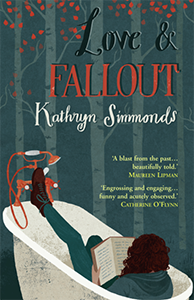Seren Books, £8.99
 Love and Fallout by Kathryn Simmonds is a perceptive and well researched exploration of an often neglected period of womens’ history, the Greenham Common Peace Camp. Quickly it begins to address philosophical issues such as female identity, relationships, consumerism and politics in a knowledgeable, often funny, well-written and poignant way. Although it maintains a lightness and easy readability, it becomes more and more adept as the plot develops and the similes improve. By the end I was sobbing, as it tenderly and nostalgically addresses some of the very real issues for those of us who were young female adults in the 1980s and who are now bringing up our own sons and daughters.
Love and Fallout by Kathryn Simmonds is a perceptive and well researched exploration of an often neglected period of womens’ history, the Greenham Common Peace Camp. Quickly it begins to address philosophical issues such as female identity, relationships, consumerism and politics in a knowledgeable, often funny, well-written and poignant way. Although it maintains a lightness and easy readability, it becomes more and more adept as the plot develops and the similes improve. By the end I was sobbing, as it tenderly and nostalgically addresses some of the very real issues for those of us who were young female adults in the 1980s and who are now bringing up our own sons and daughters.
Simmonds has a real skill and ability to portray the beauty and richness of humanity through wit and humour. This, her début novel, swings between the present and 1982, as middle-aged, still married mum-of-two, Tessa, is shocked when her best friend, Maggie, puts her forward to appear on a TV makeover show. The suggestion being that her muddy Greenham past is the reason for her fashion faux pas. Through the experience she recalls her time spent at the perimeter of the US base in Newbury when she was nineteen. We wonder how on earth Maggie and Pete (Tessa’s husband) could have ever conceived that she would enjoy the makeover or that she would agree to the broadcast, even though it seems an opportunity to promote her charitable interests. I also wondered why Tessa was married to Pete at all, not least when he remarks that, ‘Why can’t I take you out when you’re dressed like a woman for once?’ But this helps to underline the strain in their relationship which is being worked through with Valeria, the therapist, on the ‘two-seater sofa’. Simmonds is never pithy about this relationship, it has an underlying disturbing and dissatisfied reality to it. Pete’s ill-thought out comments and extra marital ‘friendships’ provide the novel with an absurd and entertaining friction.
Tessa’s marriage is not the only thing taking a nose-dive. Her eco-business, Easy Green, is going pear-shaped, as is her relationship with Pippa, her daughter, so there is a lot to repair by the end of the book. The TV makeover does prove, as promised, to change Tessa’s life forever, although in unforeseen and restorative ways.
Many readers will appreciate the popular references to Moira Stewart, Timotei, Merrydown, and Dexys Midnight Runners. There is a confident authenticity about the novel’s historical research, which is accentuated by intellectual and conversant references to Germaine Greer, Simone de Beauvoir, Spare Rib and the ‘male gaze’.
The book is in two sections, past and present, putting a magnifying glass over contemporary issues in the light of feminist politics in the 1980s. Whatever wave of feminism we are in, it doesn’t matter. The issues are disconcertingly similar albeit with altered contexts. This novel throws up inconvenient truths about sexual politics, consumerism and the green issues we live with today. We wonder if Pippa is emancipated as a result of the women’s movement in the 1980s? And whether her participation in a student beauty contest is any different a struggle or rebellion than that of her mother? Simmonds addresses body image neuroses, mental health issues, family and professional career balances as well as patriarchal structures in an accessible and entertaining style. These are worthy issues not to be diminished by marketing strategies and makeovers.
The Greenham element of the novel was, for me, the more engaging section. This may be inevitable, as through it Simmonds highlights the demise of meaning and lack of action in our present lives. However, the sections set in the present are no less sincere or insightful, the conflicts and issues for middle-aged Tessa are significant because of, not despite, the backdrop of heightened consumerism. But Simmonds is never biased, she paints a balanced picture and gives an honest representation.
The naïve conflicts of young Tessa and her contemporaries resonate. The descriptions of the camp paraphernalia, the diverse cross-section of ‘wimmin’ attracted to protest at the airbase and the atmosphere at the demonstrations were the greatest delight. They are very well researched and true to how it was. I know – I was there! The chapter entitled ‘The Muncher’ is particularly authentic, as is the diverse behaviour of the local residents. This novel transported me and I have vowed to buy a number of copies of Love and Fallout by Kathryn Simmonds to send to old associates to see if it works its restorative magic and reacquaints me with lost friends too! Perhaps I’ll also get a copy for my teenage daughter!










